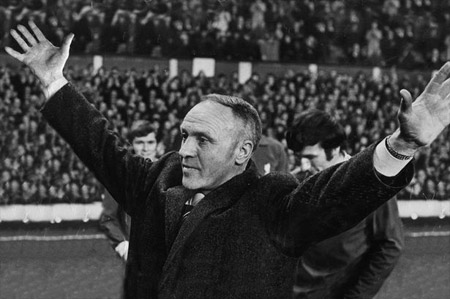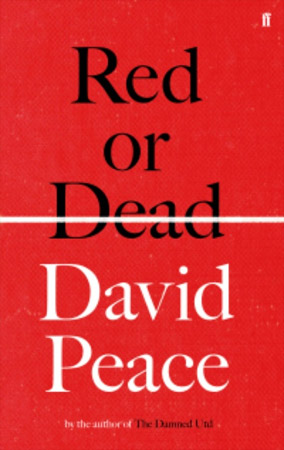
| HOME |
| NERVE |
| REVIEWS |
| ARCHIVE |
| EVENTS |
| LINKS |
| ABOUT US |
| CONTRIBUTORS |
| BACK ISSUES |
| CONTACT US |
Interview with David Peace
 Red
or Dead is a football book, dealing with the legendary Bill Shankly's
spell as manager of Liverpool Football Club, but in its ambition, scope
and narrative drive it makes The Damned United, and by extension all other
football novels, read like Roy of the Rovers. All of Peace's writing is
uncompromising, but Red or Dead takes that to near pathological levels.
Red
or Dead is a football book, dealing with the legendary Bill Shankly's
spell as manager of Liverpool Football Club, but in its ambition, scope
and narrative drive it makes The Damned United, and by extension all other
football novels, read like Roy of the Rovers. All of Peace's writing is
uncompromising, but Red or Dead takes that to near pathological levels.
The result is an extraordinary piece of writing. Red or Dead is 715 closely packed pages of driving, simplistic, repetitive prose, detailing pretty much every single thing Bill Shankly did from the moment he became manager of Liverpool until his death.
The style verges on autistic, with factual details of every game Liverpool played in the years between 1959 and Shankly's surprise resignation in 1974. In those 15 years Shankly transformed the club from struggling Second Division underachievers to a tight-knit unit that could lay claim to being the best team in England. Three league titles, two FA Cups and a Uefa Cup were won.
Interview by John Owen 2/10/2013
Do you think the legacy of Bill Shankly
will live on? Was Red Or Dead a tribute of sorts?
I think the legacy of Bill Shankly will always live on among the supporters
of Liverpool Football Club and on Merseyside, generally. However, I did
worry that for younger people, and particularly for people outside of
Merseyside, the legacy of Bill Shankly was being reduced to merely a series
of funny anecdotes or quotes taken out of their original context. So one
of the intentions of the book was to show, particularly in the first half,
the enormous struggles and sacrifices Bill Shankly - and the people around
him - had gone through in order to build and create the Liverpool Football
Club we know today. And in that respect, and all respects, to be honest,
the novel was intended to be a tribute to the man and his work.
What made a Yorkshire chap take up the
cudgels for the historic memory of Bill? Was the commercial aspect part
of the interest?
First off, I certainly wasn't drawn to writing about Bill Shankly for
any commercial reasons; you might not believe me, but I never ever think
about books, or anything really, in those terms. But I was struggling
to write the third book in my Tokyo Trilogy;
I think, looking back, I'd written myself into a bit of a corner with
Occupied City and so, before coming to the
third book afresh, I realised I first needed to write something quite
different. I was also very conscious that while all my previous books
had been very critical of corruption and crime, politics and power, I
had not really ever offered any alternatives to that criticism. So I wanted
to write a different sort of book about a different kind of man. A story
that could be inspirational. And I think it would be hard to find, especially
for nowadays, a more different and more inspirational figure than Bill
Shankly. And so that is why I began the book. But going back to the commercial
aspects of publishing, before I could begin Red Or
Dead, I had to convince my publishers, particularly my foreign
publishers, to agree to wait for the third Tokyo
book. But, luckily, they are all very patient and understanding folk.
And now, finally, I am writing that third Tokyo book
and will hopefully be able to repay their patience and understanding.
Your association with the theme of socialism
through football, which cast Shankly as a kind of working class football
Lenin - was this your wish or is it a comparative literary device.
Both, really. I think it would be impossible - and also wrong - to write
about Bill Shankly and not write about his socialism. It was integral
to the way in which he lived his life and to everything he did, on and
off the pitch. But I have also read a lot about Lenin and, in some of
the chapter headings, there are the odd nods to him, too. But more than
any other consideration, I do feel that socialism - again for younger
people in particular - is just forgotten and not known. And so I wanted
to write a Socialist Book and in a hopefully inspiring way.
 The
diversity of your novels and subject matter from history on a personal
level to Japanese serial killers to football legends, do you have a method
of choosing the subject or are you just inspired?
The
diversity of your novels and subject matter from history on a personal
level to Japanese serial killers to football legends, do you have a method
of choosing the subject or are you just inspired?
Again both, I suppose. But the key things for me are, first, that
there is a "story" there. And one with a degree of mystery about
it. For example with Red Or Dead, why did
Bill Shankly resign when he did? And then, secondly, that this story has
some meaning or resonance beyond its own time and says or asks something
about our times and the way we live now. I think that is particularly
important and true when I am writing about crime; not to glorify or wallow
in the horror and violence of the crimes themselves but to ask why these
crimes happened when and where they did, and what do they say or ask about
the society in which they occurred, and what then are the lessons and
questions of those crimes or stories for us in 2013, for example.
Do you believe the past is or was better
than the uncertainties of the future?
Well, it depends what past and which future, Johno. If you were to ask
me would I prefer to be living under a government led by Clement Atlee
or in a future envisioned by David Cameron, then I'll go back to the past.
But I think we always have to be aware of the constant rewriting of history
which goes on, and the way in which that then affects our ability to think
about the future. For example, as I was saying above, in my opinion, socialism
is being written out of history and that then prevents people from imagining,
let alone creating, a socialist future. And I do think, in general, we
are losing our ability to imagine or dream of revolution or transformation.
And so in order to give the future a chance, we have to struggle and fight
for the past and its legacy.
Has writing success and the popularity
of your works divorced you from yourself? Are you the same guy or are
you older and wiser but still hungry if not desperate?
Well, I hope I have not become divorced from myself but I also hope I
am older and wiser and still hungry and desperate to write better books.
But you'd probably be better to ask my mum or my kids than me.
Have you any tips for the upcoming novelists
and writers out there waiting to be discovered?
A very difficult question, Johno. But to try and answer it, and also the
question below, I think I was very lucky that my first published book,
1974, was accepted when it was. I had been writing for at least ten years
prior to that, and had many rejections. But in those days, and I am only
talking about the late 1990s, you could still send work unsolicited to
publishers and they would at least still read it. I don't think that is
the case these days with most publishers, certainly the big ones. I think
now most publishers only accept work through agents who, in turn, seem
to put a great emphasis on people who have completed creative writing
courses etc. And I think that is a very bad thing and the reason why so
much new writing seems so generic. But the main reason why most publishers
- not all - are so conservative these days, and resort to publishing so
many generic works, is that publishing is on its knees. And in the UK
that is largely due to the collapse of the Net Book Agreement, the subsequent
collapse of retail bookselling, and the rise of Amazon coupled with constantly
and radically changing technology. And so I am well aware how very difficult
and frustrating it is for both publishers and unpublished writers these
days. And so, at the risk of sounding either blasé or patronising,
my only advice to unpublished writers would be to keep going. I don't
believe most writers - published or unpublished - write for commercial
gain or financial security (and they would be either delusional or insane
if they did) - and so all you can do is just keep reading and learning,
writing and improving, and hoping and praying that someone somewhere will
take the time to read your work and like it.
Thanks for your time, so lastly what
are your thoughts on future of books, with that authors in general, as
eBooks and apps for new technology replacing the need for presses and
books in general? Scary or progress?
See above; but the internet certainly has the potential to provide any
writer with an easier way of finding readers for their work. But that
potential obviously depends upon the writer and the reader both having
access to a computer and electricity. The majority of the population of
the world still don't and I am not convinced the minority always will
do, so that's why I still use paper and pen.
P.S. We appreciate your valuable time
and the immense effort of research, that has gone into the creative process
in crafting this book, a workshop for writers anytime in Liverpool would
be a master class par excellence!
Thank you, Johno. And also for the suggestion of a workshop. I am a very
poor teacher but am always happy to talk to anyone who is interested and
so I hope to see you again when I am next in Liverpool.
Thanks again and my very best wishes, David.